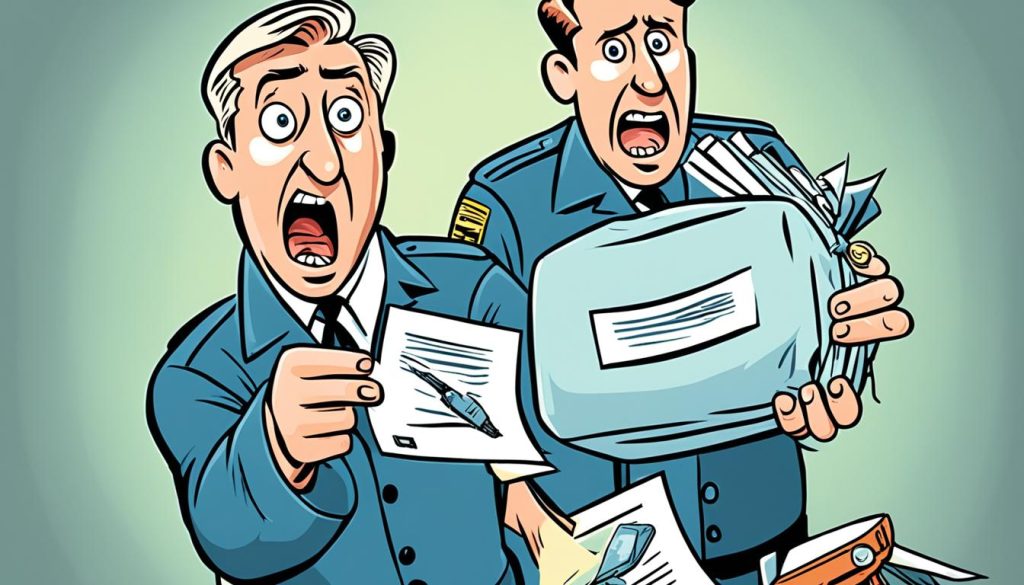Being accused of identity theft can be scary. Small thefts might not get you much jail time, but the penalties can increase as the amounts grow1. If you’re facing identity theft charges, knowing your rights and how to protect yourself is key. This article will cover what to do if accused and some top defenses against the prosecution.
Identity theft is a big deal in the U.S., with over 25,000 Texans falling victim each year2. In Texas, it can lead to a felony conviction, with the severity of the penalty depending on how much personal info was stolen2. The Texas Penal Code 32.51 says it’s illegal to get, keep, transfer, or use someone else’s info without their okay and with the aim to harm or trick them2. It also covers stealing the identity of people who have passed away2.
Key Takeaways
- Identity theft can lead to felony charges and significant penalties in Texas.
- Prosecutors must prove guilt beyond a reasonable doubt in identity theft cases.
- Effective legal defenses include lack of evidence, innocent explanation, and mistaken identity.
- Proper police procedures and consent are crucial in identity theft cases.
- Seeking immediate legal representation is crucial when facing identity theft charges.
Understanding Identity Theft and Its Legal Implications
Identity theft is a growing crime with big legal issues for those accused3. It means using someone’s personal info without permission, like their driver’s license or Social Security number4. The crime can be a misdemeanor or a felony, with punishments from fines to jail time34.
Definition and Types of Identity Theft
Identity theft means using someone’s info for illegal reasons, like getting credit or goods4. It can be as simple as signing someone else’s name on a check4. There are different types, like financial and medical identity theft, each with its own legal effects5.
Penalties and Consequences of Identity Theft Charges
Identity theft can lead to serious penalties, like up to three years in jail and fines of $10,0005. If it’s a misdemeanor, the punishment is less severe5. It can even be a federal crime, with up to 20 years in prison5. A conviction can also affect your gun rights, immigration status, and your mental well-being45.
If you’re accused of identity theft, it’s important to get a lawyer5. They can help you understand your rights and how to defend yourself5.
Immediate Steps When Accused of Identity Theft
Being accused of identity theft can feel overwhelming. But, it’s key to stay calm and act wisely to protect your rights and defend yourself. The first step is to get legal representation right away6. An expert criminal defense attorney in identity fraud cases can help a lot. They know how to handle the legal stuff and can build a strong case for you6.
Seeking Legal Representation
After getting a lawyer, they will tell you what to do next. They’ll work with you to understand the identity theft charges and plan your defense. With their help, you’ll have a strong legal support and someone fighting for you6.
Remaining Silent and Cooperative
It’s important to remain silent and not talk to the police without your lawyer6. What you say could be used against you, so it’s best to keep quiet6. But, you should still be nice and follow any legal requests, like showing your ID or answering subpoenas6.
By acting quickly and wisely, you can boost your chances of a good outcome in your identity theft case6. With a skilled criminal defense lawyer and a smart approach, you can get through the legal process. This way, you can protect your rights and reputation678.
identity theft, legal defense, fraud charges
When you face identity theft charges, knowing your legal defenses is key. Two main defenses are the lack of evidence and the innocent explanation910.
Lack of Evidence Defense
The prosecution must prove guilt beyond doubt to convict. If they can’t meet this standard, the charges might be dropped for lack of evidence11. This is true when the case relies on indirect evidence or lacks clear proof of your involvement.
Innocent Explanation Defense
Maybe the prosecution’s evidence doesn’t tell the whole story. For instance, saving someone else’s credit card number to return a lost item isn’t identity theft10. The goal is to show you didn’t act with the intent to deceive or harm.
Knowing these defenses and building a strong case can help. You might get your charges reduced or even dropped91011.
Challenging the Prosecution’s Case
When facing identity theft charges, it’s key to look at all defense options to protect your rights. Two main ways to fight the prosecution are the mistaken identity defense and the improper search and seizure defense12.
Mistaken Identity Defense
A possible defense is claiming mistaken identity. If the prosecution’s case depends a lot on eyewitnesses or other indirect evidence, a good lawyer can question their trustworthiness. They can show you were not the one committing the crime12.
Improper Search and Seizure Defense
Another defense is questioning the police’s search methods. If the police searched without a legal warrant, or got a warrant illegally, any evidence found might not be allowed in court12. This could really hurt the prosecution’s case and make it hard for them to win.
By challenging the prosecution, you could get a better result, like charges dropped, a lighter sentence, or being found not guilty13. A skilled lawyer is key in handling an identity theft case and defending your rights13.

Remember, identity theft can lead to big fines and jail time14. The exact penalties depend on where you are and the crime you’re accused of. It’s vital to work with a lawyer who knows the law to find the best defense and protect you.
Understanding Consent and Intent in Identity Theft Cases
When fighting identity theft charges, knowing about consent and intent is key. Showing you had permission to use someone’s info can be a strong defense15. Saying you didn’t mean to commit fraud can also help your case15.
Consent or Authorization Defense
If you had permission to use someone’s personal info, it weakens the prosecution’s case15. This might be true if you were working for a company or helping a friend with their info15. With proof of permission, you can fight the identity theft charges well.
Lack of Fraudulent Intent Defense
Another defense is saying you didn’t plan to commit fraud15. Any wrong actions might have been a mistake or an accident15. The prosecution must show you used the stolen identity for fraud. If you didn’t mean to, it hurts their case against you.
| Identity Theft Classification | Potential Jail Time | Maximum Fine |
|---|---|---|
| Standard Identity Theft (Class 4 Felony) | 1.5 to 3 years | $150,000 |
| Aggravated Identity Theft (Class 3 Felony) | 2.5 to 7 years | $150,000 |
| Identity Trafficking (Class 2 Felony) | 4 to 10 years | $500,000 |
Judges in Arizona decide the punishment based on the case details and the defendant’s cooperation16. The prosecution must prove the defendant used someone’s identity without consent16.
Identity theft can be a misdemeanor or felony, based on the money involved and the defendant’s past15. Mistakes in identity theft are common, and a good lawyer can help with these cases15.
If you’re facing identity theft charges, get help from a skilled defense attorney16. Binnall Law Group, PLLC is an expert in defending against identity theft15. They offer free, confidential advice to help you understand your options and build a strong defense16.
Conclusion
Being accused of identity theft can feel overwhelming. But, with the right legal plan and a skilled lawyer, you can get through it. Knowing the penalties for identity theft and fraud in California173> helps you prepare and boost your chances of a good outcome.
The prosecution must prove your guilt beyond doubt. A criminal defense lawyer can help you use defenses like lack of evidence or mistaken identity. Understanding consent and intent is also key to your case.
Identity theft can lead to big financial losses and harm your reputation18. Over 8.4 million U.S. adults were victims last year, with losses hitting $56.6 billion18. Taking steps to defend yourself can protect your rights and future. Getting legal advice is crucial when dealing with identity theft and fraud in California and federal law.
FAQ
What should I do if I’m accused of identity theft?
First, find a lawyer and don’t talk to the police without their advice. They can guide you on how to defend yourself.
What are some common defenses against identity theft charges?
You might argue there’s no proof, you didn’t do it, the police didn’t follow the rules, you had permission, or you didn’t mean to commit fraud.
How can improper police procedure impact an identity theft case?
If the police didn’t follow the rules, like not having a warrant, their evidence might not be allowed in court. This weakens the case against you.
Can I use the defense that I had consent or authorization to use someone’s personal information?
Yes, if you can prove you had permission, this could help you fight the identity theft charges.
How important is it to prove I lacked fraudulent intent?
Showing you didn’t mean to commit fraud and any use of someone else’s info was an accident can be a strong defense.
Source Links
- Defending Yourself Against Identity Theft Charges | Teakell Law
- Defense Against Identity Theft Charges – Capetillo Law Firm
- Identity Theft – FindLaw
- § 530.5 PC – “Identity Theft” – California Law & Penalties
- The Main Types of Identity Theft and Their Potential Penalties – Los Angeles Criminal Defense Blog
- Defending Yourself Against Identity Theft Charges | Teakell Law
- Can Identity Theft Charges Be Dropped? | Law Office of Nayib Hassan
- Combating Identity Theft and Credit Card Fraud in California
- New York Identity Theft Crime Defense Lawyer | Dupée & Monroe P.C.
- The Law Offices of Jed Silverman
- Identity Theft | Chicago Criminal Defense Lawyers David S. Olshansky & Associates
- Possible Defenses for Identity Theft – Typical Strategies
- Navigating Identity Theft Defenses – Olivero Law, P.A.
- Identity Theft Laws | 18 U.S.C § 1028 – Kolsrud Law Offices
- Defenses to Identity Theft | Binnall Law Group
- Identity Theft Charges In Arizona | ARS 12-2008
- Possible Defenses for Fraud – A Defense Lawyer’s Perspective

